Adams J.T. Empire on the Seven Seas. The British Empire 1784-1939
Подождите немного. Документ загружается.

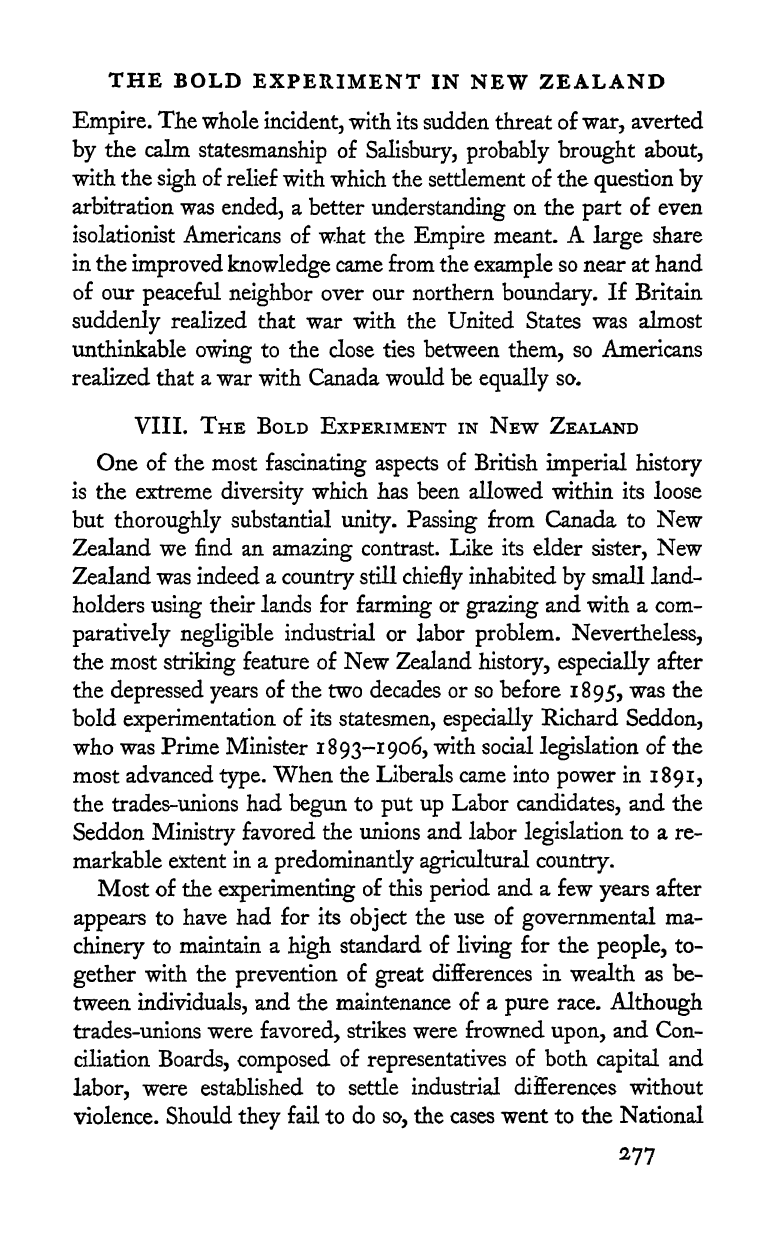
THE
BOLD
EXPERIMENT
IN
NEW
ZEALAND
Empire.
The
whole
incident,
with its sudden threat of
war,
averted
by
the
calm
statesmanship
of
Salisbury, probably brought
about,
with
the
sigh
of
relief
with
which the settlement
of
the
question
by
arbitration was
ended,
a
better
understanding
on the
part
of
even
isolationist
Americans of
what the
Empire
meant.
A
large
share
in
the
improved
knowledge
came
from
the
example
so
near at hand
of our
peaceful
neighbor
over our
northern
boundary.
If Britain
suddenly
realized that war with the
United
States
was almost
unthinkable
owing
to the dose
ties between
them,
so Americans
realized
that
a
war
with
Canada would
be
equally
so*
VIII. THE
BOLD
EXPERIMENT
IN
NEW
ZEALAND
One
of
the most
fascinating
aspects
of British
imperial
history
is
the extreme
diversity
which has
been
allowed within its
loose
but
thoroughly
substantial
unity.
Passing
from
Canada to New
Zealand we
find
an
amazing
contrast. Like
its elder
sister,
New
Zealand was
indeed
a
country
still
chiefly
inhabited
by
small
land-
holders
using
their lands for
farming
or
grazing
and
with
a com-
paratively negligible
industrial
or
labor
problem.
Nevertheless,
the
most
striking
feature of New
Zealand
history,
especially
after
the
depressed years
of
the two decades
or so before
1895,
was
the
bold
experimentation
of its
statesmen,
especially
Richard
Seddon,
who
was
Prime
Minister
1893-1906,
with social
legislation
of
the
most
advanced
type.
When
the Liberals came into
power
in
1891,
the
trades-unions
had
begun
to
put up
Labor
candidates,
and the
Seddon
Ministry
favored
the
unions
and
labor
legislation
to a re-
markable
extent
in a
predominantly
agricultural country.
Most
of the
experimenting
of this
period
and a
few
years
after
appears
to
have had
for its
object
the
use
of
governmental
ma-
chinery
to maintain
a
high
standard of
living
for the
people,
to-
gether
with
the
prevention
of
great
differences
in
wealth as
be-
tween
individuals,
and
the
maintenance of
a
pure
race.
Although
trades-unions
were
favored,
strikes
were
frowned
upon,
and
Con-
ciliation
Boards,
composed
of
representatives
of both
capital
and
labor,
were established
to
settle industrial differences without
violence. Should
they
fail
to
do
so,
the cases
went
to the
National
277
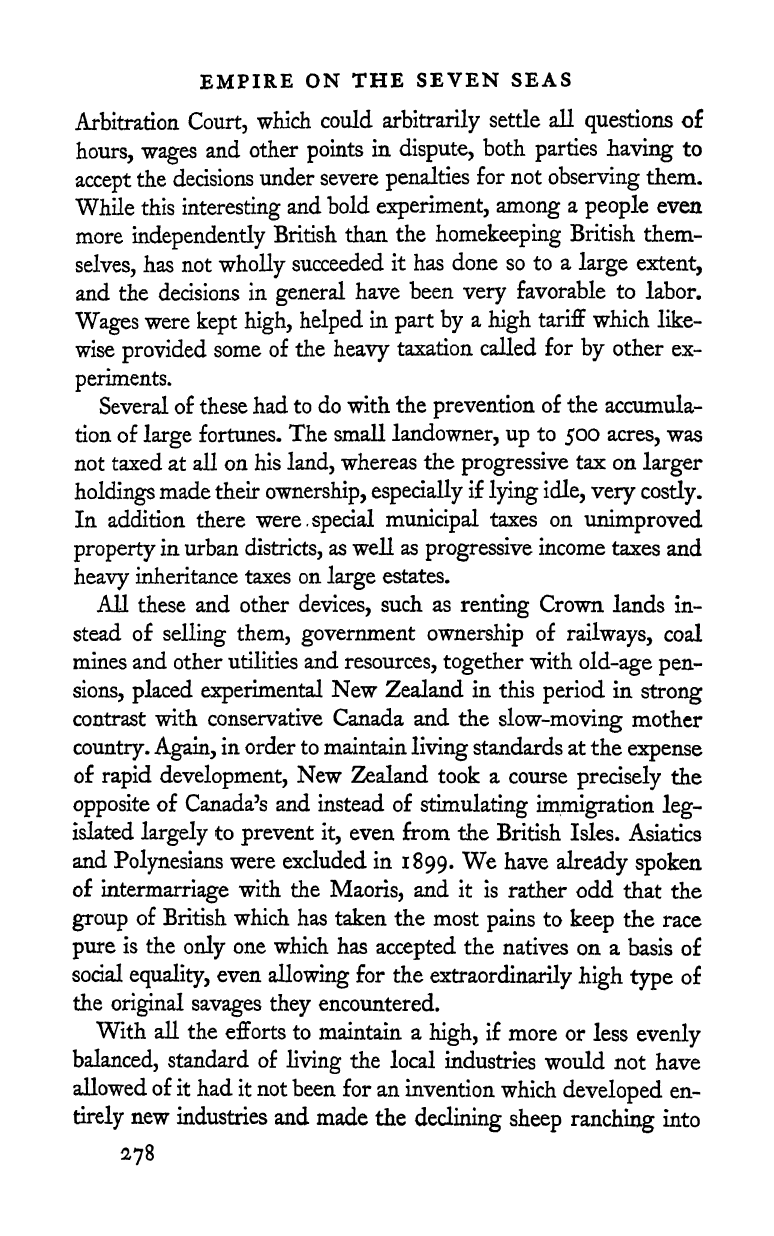
EMPIRE
ON
THE
SEVEN
SEAS
Arbitration
Court,
which
could
arbitrarily
settle
all
questions
of
hours,
wages
and
other
points
in
dispute,
both
parties
having
to
accept
the
decisions
under severe
penalties
for
not
observing
them.
While
this
interesting
and
bold
experiment,
among
a
people
even
more
independently
British
than
the
homekeeping
British them-
selves,
has
not
wholly
succeeded
it
has done so to
a
large
extent,
and
the decisions
in
general
have
been
very
favorable to
labor.
Wages
were
kept
high,
helped
in
part
by
a
high
tariff
which
like-
wise
provided
some
of
the
heavy
taxation
called
for
by
other
ex-
periments.
Several
of these
had
to
do with
the
prevention
of
the
accumula-
tion of
large
fortunes.
The
small
landowner,
up
to
500
acres,
was
not
taxed
at
all
on
his
land,
whereas
the
progressive
tax
on
larger
holdings
made
their
ownership,
especially
if
lying
idle,
very
costly.
In
addition
there
were.
special
municipal
taxes on
unimproved
property
in urban
districts,
as
well
as
progressive
income
taxes and
heavy
inheritance
taxes
on
large
estates.
All
these and other
devices,
such
as
renting
Crown
lands in-
stead
of
selling
them,
government
ownership
of
railways,
coal
mines
and
other
utilities
and
resources,
together
with
old-age pen-
sions,
placed experimental
New
Zealand in
this
period
in
strong
contrast with conservative
Canada and the
slow-moving
mother
country.
Again,
in order to
maintain
living
standards
at the
expense
of
rapid
development,
New
Zealand
took a
course
precisely
the
opposite
of Canada's
and
instead
of
stimulating immigration
leg-
islated
largely
to
prevent
it,
even
from
the
British Isles.
Asiatics
and
Polynesians
were
excluded in
1899.
We
have
already
spoken
of
intermarriage
with
the
Maoris,
and
it
is
rather
odd
that
the
group
of
British which
has taken the
most
pains
to
keep
the
race
pure
is the
only
one which
has
accepted
the
natives
on
a
basis of
social
equality,
even
allowing
for
the
extraordinarily
high
type
of
the
original
savages
they
encountered.
With
all
the
efforts
to maintain
a
high,
if
more
or
less
evenly
balanced,
standard of
living
the
local
industries
would not
have
allowed
of
it
had
it
not
been
for an
invention
which
developed
en-
tirely
new
industries
and made
the
declining
sheep
ranching
into
278
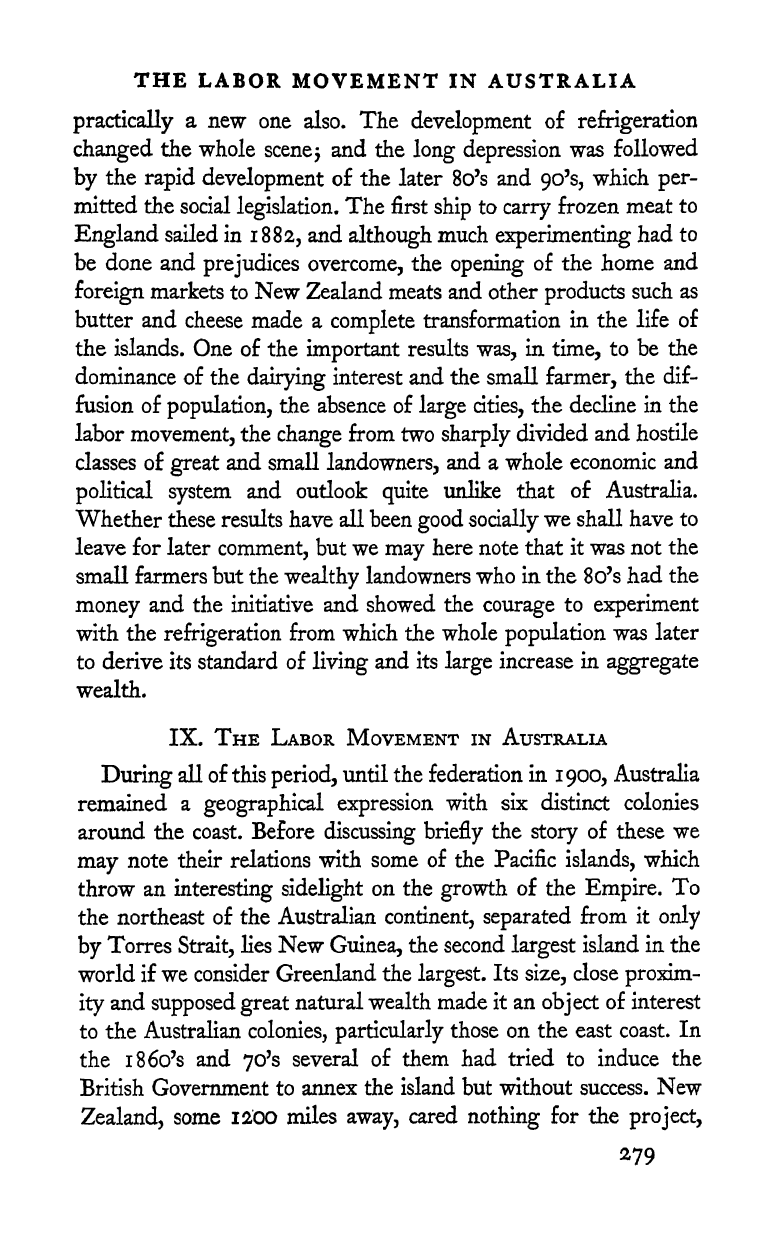
THE
LABOR
MOVEMENT IN
AUSTRALIA
practically
a
new one
also.
The
development
of
refrigeration
changed
the
whole
scene
j
and the
long
depression
was
followed
by
the
rapid
development
of the
later
8o's
and
go's,
which
per-
mitted the
social
legislation.
The
first
ship
to
carry
frozen
meat
to
England
sailed
in
1882,
and
although
much
experimenting
had
to
be
done
and
prejudices
overcome,
the
opening
of
the
home
and
foreign
markets
to
New
Zealand
meats
and
other
products
such
as
butter and
cheese made
a
complete
transformation
in
the
life
of
the
islands. One of
the
important
results
was,
in
time,
to
be the
dominance of
the
dairying
interest and the
small
farmer,
the
dif-
fusion of
population,
the
absence
of
large
cities,
the
decline
in
the
labor
movement,
the
change
from
two
sharply
divided
and
hostile
classes
of
great
and
small
landowners,
and
a whole
economic
and
political
system
and outlook
quite
unlike
that
of Australia.
Whether
these results
have
all been
good
socially
we shall
have
to
leave
for
later
comment,
but
we
may
here note
that
it was not
the
small
farmers but
the
wealthy
landowners
who
in
the
8o's
had
the
money
and the initiative
and
showed
the
courage
to
experiment
with
the
refrigeration
from which
the
whole
population
was
later
to
derive
its
standard
of
living
and
its
large
increase in
aggregate
wealth.
IX. THE
LABOR MOVEMENT IN AUSTRALIA
During
all of this
period,
until
the federation
in
1900,
Australia
remained
a
geographical
expression
with
six
distinct
colonies
around
the coast.
Before
discussing
briefly
the
story
of
these
we
may
note
their
relations
with
some
of
the
Pacific
islands,
which
throw
an
interesting
sidelight
on the
growth
of
the
Empire.
To
the
northeast of
the
Australian
continent,
separated
from
it
only
by
Torres
Strait,
lies New
Guinea,
the second
largest
island in
the
world
if
we consider Greenland
the
largest.
Its
size,
close
proxim-
ity
and
supposed
great
natural
wealth
made it an
object
of
interest
to
the
Australian
colonies,
particularly
those on the east
coast.
In
the
i86o's
and
70*8
several of
them had tried to
induce
the
British Government
to
annex the
island
but
without success. New
Zealand,
some
1200 miles
away,
cared
nothing
for the
project,
279
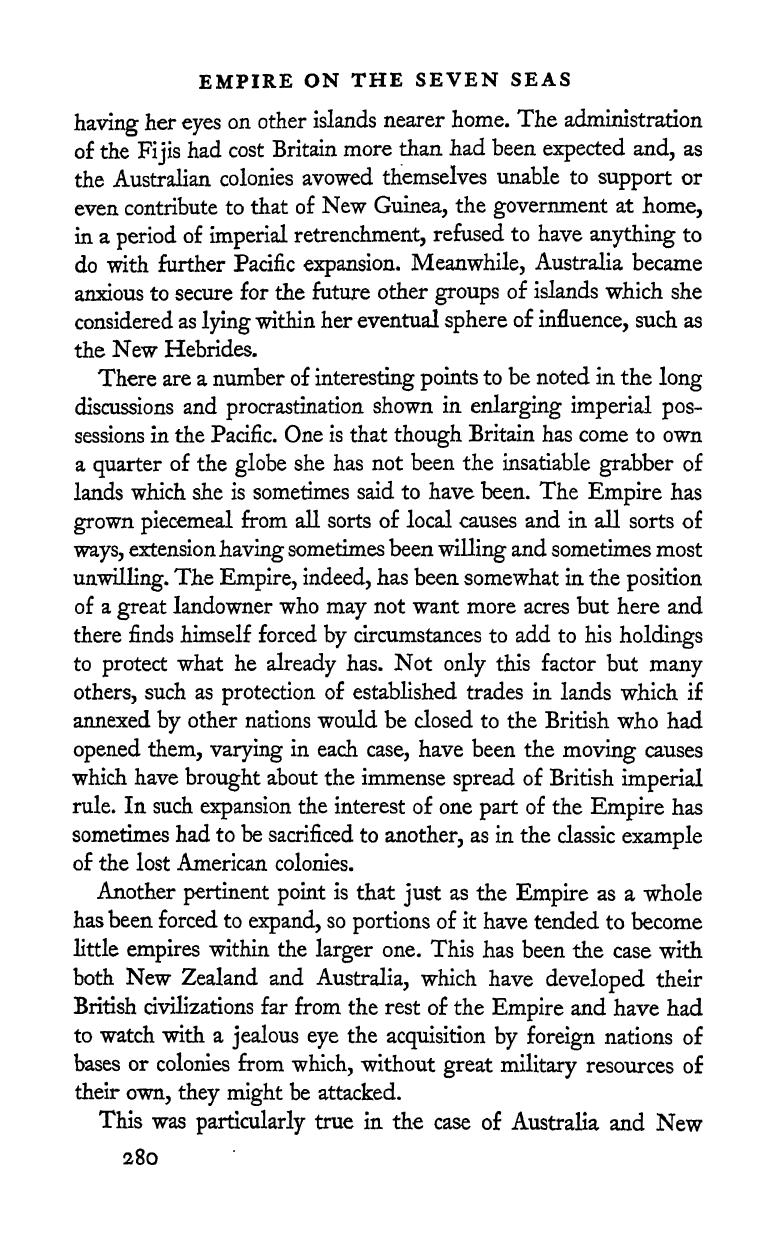
EMPIRE
ON
THE
SEVEN SEAS
having
her
eyes
on
other
islands
nearer
home.
The
administration
of the
Fijis
had
cost
Britain
more
than
had
been
expected
and,
as
the
Australian
colonies
avowed
themselves
unable
to
support
or
even
contribute
to
that
of
New
Guinea,
the
government
at
home,
in
a
period
of
imperial
retrenchment,
refused
to
have
anything
to
do
with
further
Pacific
expansion.
Meanwhile,
Australia
became
anxious
to
secure
for the
future
other
groups
of
islands
which she
considered
as
lying
within
her
eventual
sphere
of
influence,
such
as
the
New
Hebrides.
There
are
a
number of
interesting
points
to
be
noted
in
the
long
discussions
and
procrastination
shown
in
enlarging
imperial
pos-
sessions
in the
Pacific.
One
is
that
though
Britain has
come
to
own
a
quarter
of
the
globe
she has
not been the
insatiable
grabber
of
lands
which she
is sometimes
said to have
been.
The
Empire
has
grown
piecemeal
from all
sorts of
local
causes
and in all
sorts of
ways,
extension
having
sometimes
been
willing
and
sometimes most
unwilling.
The
Empire,
indeed,
has
been
somewhat
in the
position
of
a
great
landowner
who
may
not
want
more
acres but here
and
there finds himself
forced
by
circumstances
to
add
to
his
holdings
to
protect
what
he
already
has. Not
only
this
factor
but
many
others,
such as
protection
of established trades in
lands
which
if
annexed
by
other nations would
be closed
to the British
who
had
opened
them,
varying
in
each
case,
have been the
moving
causes
which
have
brought
about
the immense
spread
of
British
imperial
rule.
In
such
expansion
the interest of one
part
of the
Empire
has
sometimes
had to
be
sacrificed
to
another,
as in the
classic
example
of
the
lost
American
colonies.
Another
pertinent
point
is
that
just
as
the
Empire
as
a
whole
has
been
forced to
expand,
so
portions
of it
have tended
to become
little
empires
within the
larger
one.
This
has
been
the
case
with
both New
Zealand and
Australia,
which
have
developed
their
British
civilizations
far
from
the rest
of the
Empire
and
have
had
to
watch with
a
jealous
eye
the
acquisition
by
foreign
nations
of
bases
or
colonies
from
which,
without
great
military
resources of
their
own,
they might
be
attacked.
This was
particularly
true in the
case
of
Australia
and
New
280
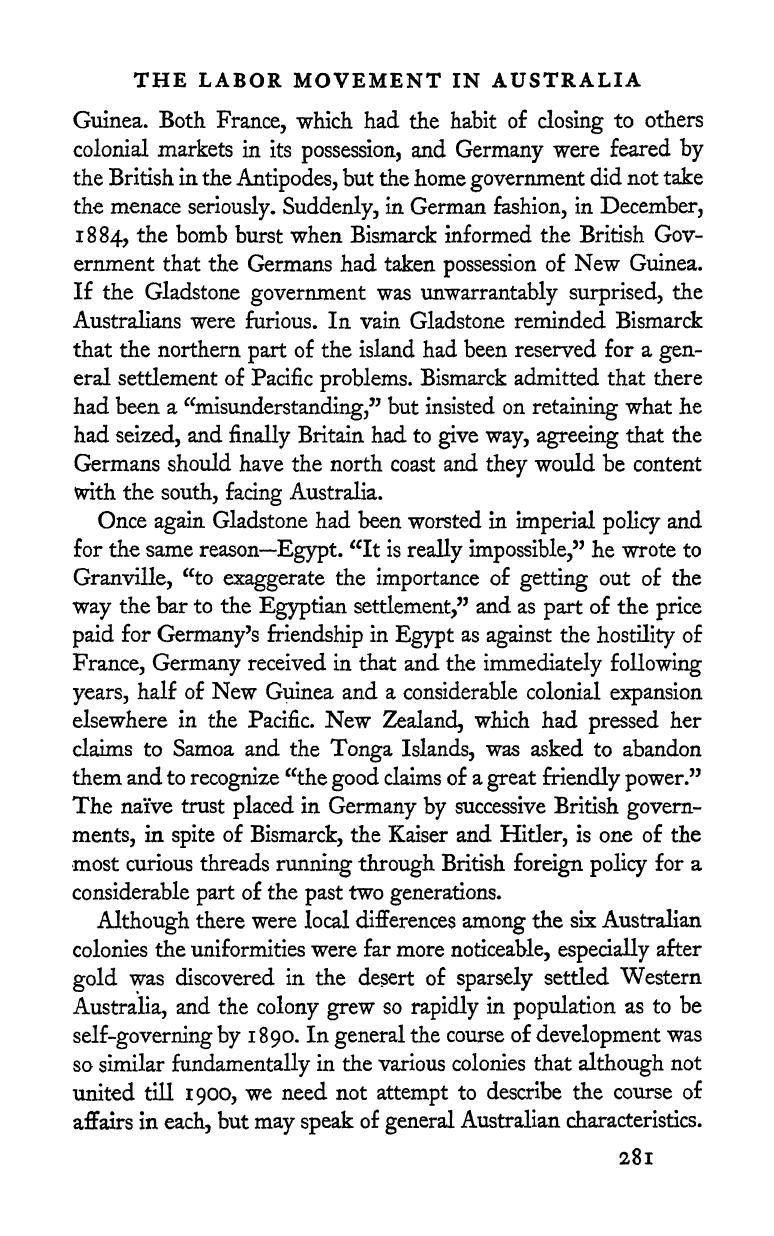
THE LABOR
MOVEMENT IN
AUSTRALIA
Guinea.
Both
France,
which
had
the
habit
of
closing
to
others
colonial markets
in its
possession,
and
Germany
were
feared
by
the British
in
the
Antipodes,
but
the home
government
did
not
take
the
menace
seriously.
Suddenly,
in
German
fashion,
in
December,
1884,
the
bomb
burst
when
Bismarck
informed
the British Gov-
ernment
that the
Germans had
taken
possession
of New
Guinea.
If
the
Gladstone
government
was
unwarrantably surprised,
the
Australians
were furious.
In
vain Gladstone
reminded
Bismarck
that the northern
part
of
the
island
had
been
reserved for
a
gen-
eral
settlement
of
Pacific
problems.
Bismarck admitted
that there
had been a
"misunderstanding,"
but
insisted
on
retaining
what he
had
seized,
and
finally
Britain
had
to
give
way,
agreeing
that
the
Germans should have the north
coast
and
they
would
be content
with
the
south,
facing
Australia.
Once
again
Gladstone
had
been
worsted
in
imperial
policy
and
for the same
reasonEgypt.
"It is
really
impossible,"
he
wrote
to
Granville,
"to
exaggerate
the
importance
of
getting
out of
the
way
the
bar
to
the
Egyptian
settlement,"
and
as
part
of
the
price
paid
for
Germany's
friendship
in
Egypt
as
against
the
hostility
of
France,
Germany
received in
that and the
immediately
following
years,
half of
New Guinea
and
a
considerable colonial
expansion
elsewhere
in
the
Pacific.
New
Zealand,
which had
pressed
her
claims
to Samoa
and
the
Tonga
Islands,
was
asked to abandon
them
and to
recognize
"the
good
claims of
a
great
friendly
power."
The
naive trust
placed
in
Germany
by
successive
British
govern-
ments,
in
spite
of
Bismarck,
the
Kaiser and
Hitler,
is
one
of
the
most
curious threads
running through
British
foreign policy
for a
considerable
part
of
the
past
two
generations.
Although
there were
local
differences
among
the
six
Australian
colonies
the
uniformities
were
far
more
noticeable,
especially
after
gold
was
discovered
in
the
desert
of
sparsely
settled Western
Australia,
and the
colony
grew
so
rapidly
in
population
as to
be
self-governing
by
1890.
In
general
the
course of
development
was
so
similar
fundamentally
in the various colonies
that
although
not
united
till
1900,
we
need not
attempt
to
describe the
course of
affairs
in
each,
but
may
speak
of
general
Australian
characteristics.
281
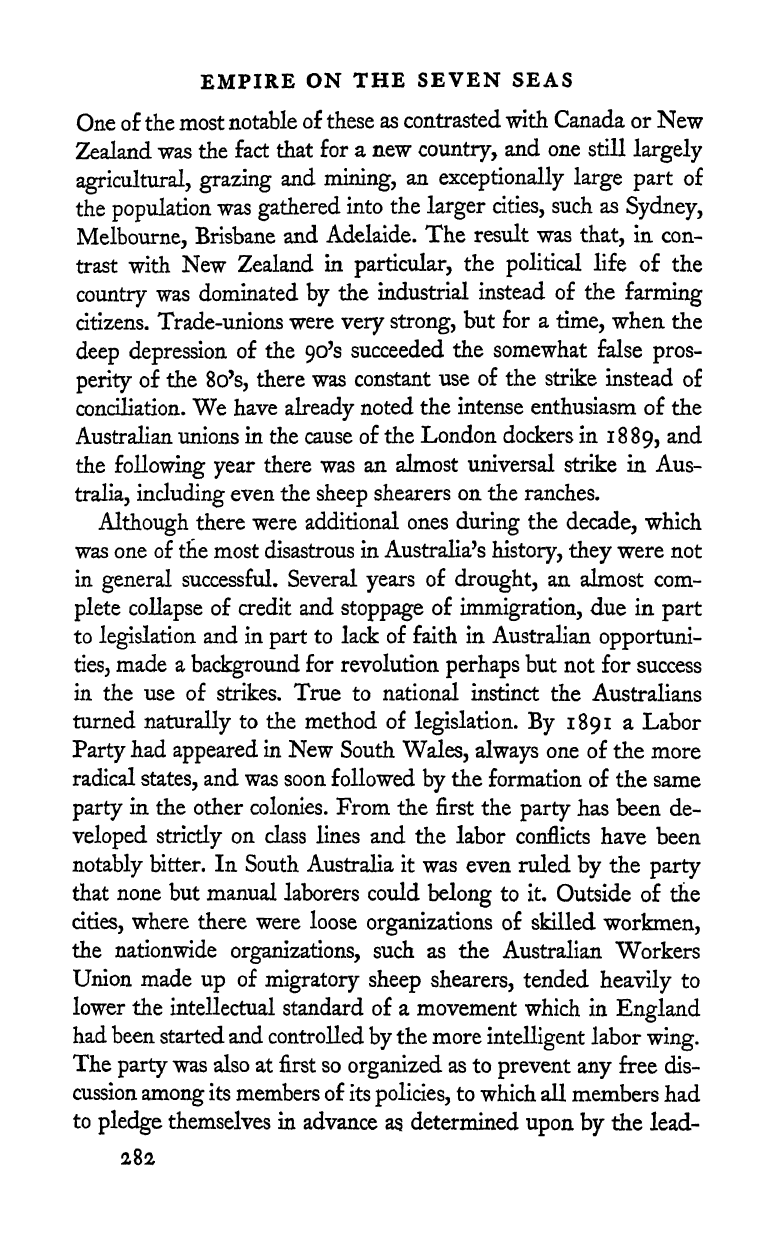
EMPIRE
ON
THE
SEVEN
SEAS
One
of the
most
notable
of these
as contrasted
with
Canada
or
New
Zealand
was
the
fact that
for
a
new
country,
and
one
still
largely
agricultural,
grazing
and
mining,
an
exceptionally large part
of
the
population
was
gathered
into the
larger
cities,
such
as
Sydney,
Melbourne,
Brisbane
and
Adelaide.
The result was
that,
in
con-
trast
with
New
Zealand
in
particular,
the
political
life
of
the
country
was
dominated
by
the
industrial
instead of
the
farming
citizens.
Trade-unions
were
very
strong,
but
for
a
time,
when
the
deep
depression
of the
90*3
succeeded
the
somewhat false
pros-
perity
of
the
8o's,
there
was constant
use of the
strike
instead
of
conciliation.
We
have
already
noted
the
intense
enthusiasm
of
the
Australian unions
in
the cause
of
the
London dockers
in
1889,
and
the
following year
there
was
an
almost universal
strike
in Aus-
tralia,
including
even the
sheep
shearers on
the
ranches.
Although
there were
additional ones
during
the
decade,
which
was
one
of the most disastrous
in Australia's
history,
they
were
not
in
general
successful.
Several
years
of
drought,
an
almost com-
plete
collapse
of credit
and
stoppage
of
immigration,
due in
part
to
legislation
and
in
part
to lack
of
faith
in
Australian
opportuni-
ties,
made a
background
for
revolution
perhaps
but
not for
success
in
the
use of strikes.
True to national instinct
the
Australians
turned
naturally
to
the
method
of
legislation. By
1891
a Labor
Party
had
appeared
in New
South
Wales,
always
one of
the
more
radical
states,
and
was soon
followed
by
the
formation
of the same
party
in the
other colonies.
From
the
first the
party
has been de-
veloped
strictly
on class
lines
and
the labor
conflicts
have been
notably
bitter.
In
South
Australia it was
even ruled
by
the
party
that
none but manual
laborers could
belong
to
it.
Outside
of the
cities,
where there were loose
organizations
of skilled
workmen,
the nationwide
organizations,
such
as
the
Australian
Workers
Union
made
up
of
migratory
sheep
shearers,
tended
heavily
to
lower
the intellectual standard of
a
movement which
in
England
had been
started and
controlled
by
the more
intelligent
labor
wing.
The
party
was
also
at
first so
organized
as to
prevent
any
free
dis-
cussion
among
its
members of
its
policies,
to
which all
members had
to
pledge
themselves
in
advance
as
determined
upon by
the
lead-
282
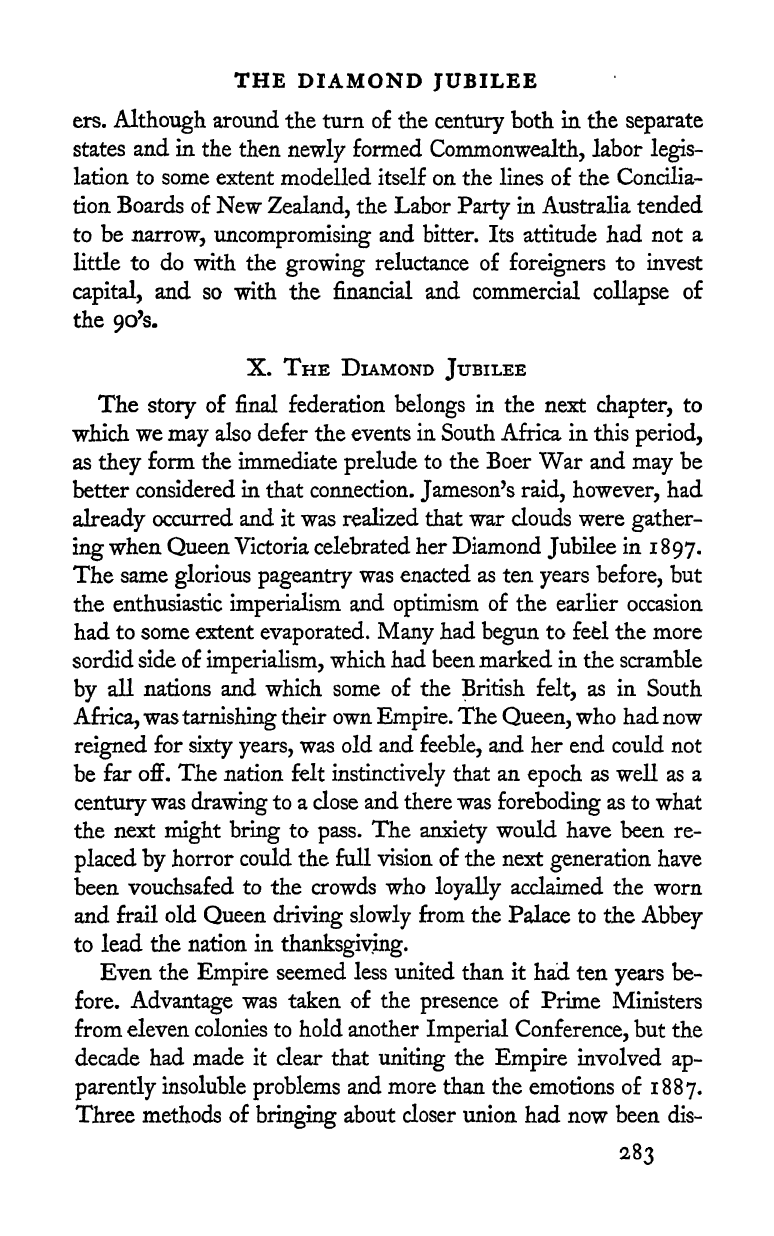
THE
DIAMOND
JUBILEE
ers.
Although
around
the turn of
the
century
both in the
separate
states
and
in
the
then
newly
formed
Commonwealth,
labor
legis-
lation
to some
extent
modelled itself on the
lines of
the
Concilia-
tion
Boards
of
New
Zealand,
the
Labor
Party
in
Australia
tended
to
be
narrow,
uncompromising
and bitten Its
attitude had
not
a
little to do
with the
growing
reluctance of
foreigners
to
invest
capital,
and
so
with the
financial
and
commercial
collapse
of
the
90'$.
X. THE DIAMOND
JUBILEE
The
story
of final federation
belongs
in
the
next
chapter,
to
which
we
may
also defer the
events
in
South
Africa in
this
period,
as
they
form the
immediate
prelude
to the Boer
War and
may
be
better
considered in
that
connection.
Jameson's
raid, however,
had
already
occurred
and
it was
realized
that
war
clouds were
gather-
ing
when
Queen
Victoria
celebrated
her
Diamond
Jubilee
in
1897,
The
same
glorious
pageantry
was enacted
as
ten
years
before,
but
the
enthusiastic
imperialism
and
optimism
of
the
earlier
occasion
had
to
some
extent
evaporated.
Many
had
begun
to
feel the
more
sordid
side
of
imperialism,
which
had
been
marked in
the scramble
by
all
nations
and
which
some
of
the
British
felt,
as
in
South
Africa,
was
tarnishing
their
own
Empire.
The
Queen,
who
had now
reigned
for
sixty
years,
was
old
and
feeble,
and
her end
could
not
be
far off.
The
nation
felt
instinctively
that
an
epoch
as
well as
a
century
was
drawing
to a close
and there
was
foreboding
as to
what
the
next
might bring
to
pass.
The
anxiety
would
have been re-
placed
by
horror
could
the
full vision of
the
next
generation
have
been
vouchsafed
to the
crowds
who
loyally
acclaimed the
worn
and
frail
old
Queen
driving
slowly
from the
Palace to the
Abbey
to
lead the
nation in
thanksgiving.
Even
the
Empire
seemed
less
united than it
had
ten
years
be-
fore.
Advantage
was taken of
the
presence
of
Prime
Ministers
from
eleven colonies
to
hold another
Imperial
Conference,
but the
decade
had
made it
clear
that
uniting
the
Empire
involved
ap-
parently
insoluble
problems
and
more
than the
emotions
of
1887*
Three
methods
of
bringing
about
closer union
had
now
been dis-
283
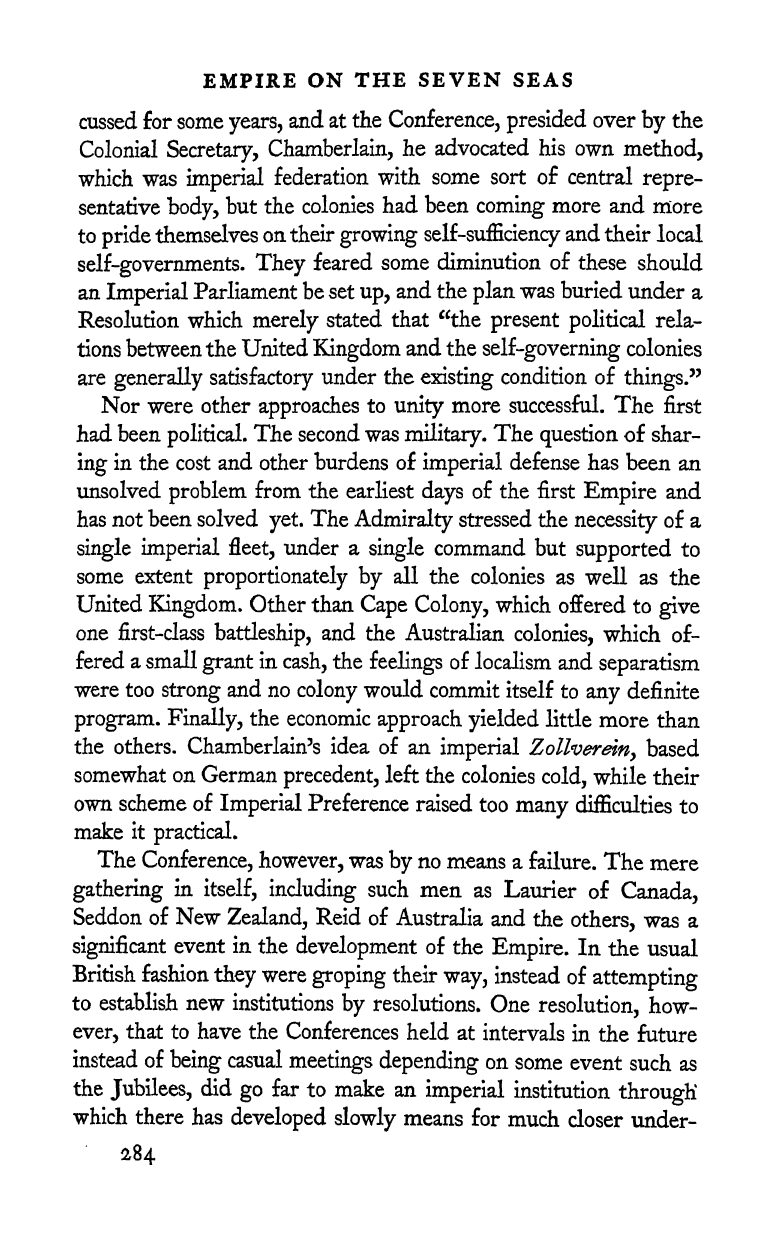
EMPIRE
ON
THE
SEVEN
SEAS
cussed
for some
years,
and at
the
Conference,
presided
over
by
the
Colonial
Secretary,
Chamberlain,
he
advocated his
own
method,
which
was
imperial
federation with
some
sort
of
central
repre-
sentative
body,
but
the colonies
had been
coming
more
and
more
to
pride
themselves
on their
growing
self-sufficiency
and their
local
self-governments.
They
feared
some diminution
of
these
should
an
Imperial
Parliament be
set
up,
and the
plan
was buried
under
a
Resolution
which
merely
stated that "the
present
political
rela-
tions between
the
United
Kingdom
and the
self-governing
colonies
are
generally
satisfactory
under
the
existing
condition of
things."
Nor were
other
approaches
to
unity
more successful.
The
first
had
been
political.
The
second
was
military.
The
question
of
shar-
ing
in the
cost
and other burdens of
imperial
defense
has
been an
unsolved
problem
from
the earliest
days
of the first
Empire
and
has
not been solved
yet.
The
Admiralty
stressed the
necessity
of
a
single
imperial
fleet,
under
a
single
command
but
supported
to
some
extent
proportionately
by
all
the colonies
as
well as
the
United
Kingdom.
Other than
Cape
Colony,
which
offered
to
give
one
first-class
battleship,
and
the
Australian
colonies,
which
of-
fered
a
small
grant
in
cash,
the
feelings
of
localism
and
separatism
were
too
strong
and no
colony
would
commit
itself
to
any
definite
program.
Finally,
the economic
approach yielded
little
more
than
the others. Chamberlain's
idea
of
an
imperial
Zollverein,
based
somewhat on
German
precedent,
left the
colonies
cold,
while
their
own
scheme of
Imperial
Preference
raised
too
many
difficulties to
make it
practical.
The
Conference,
however,
was
by
no
means a
failure.
The
mere
gathering
in
itself,
including
such
men
as
Laurier
of
Canada,
Seddon
of New
Zealand,
Reid
of
Australia and
the
others,
was a
significant
event
in
the
development
of
the
Empire.
In
the
usual
British fashion
they
were
groping
their
way,
instead
of
attempting
to
establish
new
institutions
by
resolutions.
One
resolution,
how-
ever,
that
to have
the
Conferences
held at
intervals
in
the
future
instead of
being
casual
meetings
depending
on
some
event
such as
the
Jubilees,
did
go
far
to
make
an
imperial
institution
through
which
there
has
developed
slowly
means
for
much
closer
under-
284

THE
DIAMOND
JUBILEE
standing
between
the
home
and
the
colonial
and Dominion
gov-
ernments.
In
spite
of the refusals
to
accept
any
ready-made plans
for
closer
union,
the
unity
of
Empire
was
growing,
as
the
events
of
both
the Boer
War
and
the
World
War
were
indubitably
to
prove.
285

CHAPTER
XIII
THE REACTION
FROM
IMPERIALISM
I.
THE
BOER WAR
A:HE
very
end
of
the
century
there was to
be a
great
crisis
in
the
Empire.
It
was
more
dangerous
than
even the
Indian
Mutiny,
because it
threatened to
divide
the
English people
and their
power
at
a
time
when
they
stood
isolated
without
a
single
ally
in
a
hostile world.
It
did
result in a
serious
cleavage
of
opinion
among
the
most
sober-minded
Englishmen
on the
subject
of im-
perialism
little
more than
a decade
before
they
had
to sail into the
hurricane
of the
World
War
as
a
united
nation. For some
time
many
Englishmen,
especially among
the
Liberals,
had been
seri-
ously searching
their hearts
as
to the ethical
aspects
of
the
new
type
of
imperialism
which the international rush for
empire
had
brought
into
being.
We
speak casually
of
British, French,
Germans,
Americans and
others as
though
they
all
belonged
to a
single
stereotype
of
char-
acter
and
thought.
Of
course
they
do
not.
Biological analysis
and
careless
thinking
mislead us.
From
one
standpoint
individuals
are
the
cells of the national
body
but unlike
the
cells of
a
physical
organism
they
differ
among
themselves
immensely
in
opinion
and
outlook.
The cells
of
a
biological
organism
do make a
stereotype,
but
not
those
of
a nation. A
lion of
today
is
precisely
like a
lion
of
a
century
ago
but the
essentially
peace-loving
"France"
of
today
is
quite
unlike the
"France"
of
Napoleon's
time.
In
telling
the
story
of
any
nation
we
have
to
bear such
differences
in
mind.
In
286
